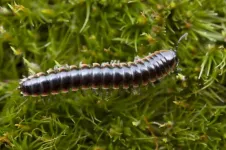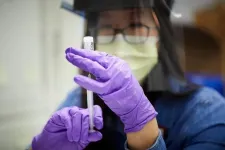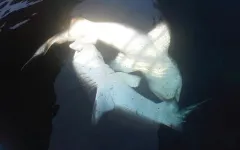(Press-News.org) Hearing the words "new species discovered" may conjure images of deep caves, uncharted rainforests, or hidden oases in the desert.
But the reality is that thousands of new species are discovered each year by enterprising scientists all over the world. Many of these new species do come from exotic locations, but more surprisingly, many come from just down the road, including the newest member of the Hokie Nation, the millipede Nannaria hokie.
The newest Hokie -- which has about 60 more legs than the HokieBird -- was discovered living under rocks by the Duck Pond behind the Grove on Virginia Tech's Blacksburg campus. Since then, the critter has been found at the area commonly referred to as stadium woods and in town in Blacksburg as well.
"It's not every day that we find new species, let alone on our campus, so we wanted to name the new species for the Virginia Tech community and to highlight the importance of conserving native habitat in the region," said Paul Marek, a systematics and taxonomy associate professor in Virginia Tech's Department of Entomology in the College of Agriculture and Life Sciences.
Nannaria hokie (pronounced nan-aria ho-key) is about 2 centimeters long, and a dark reddish millipede with yellow-white highlights (apologies to those who thought it would be maroon and orange). These creatures are roughly the size of a penny and usually find their home under rocks, leaves, and among other forest floor debris. The common name "Hokie twisted-claw millipede" comes from the presence of twisted claws on their feet before their reproductive organs.
Millipede biodiversity is the primary focus of Marek's lab, which investigates habitats all over the world, including Vietnam, Japan, and the United States. Marek, recent entomology graduate Jackson Means, and other co-authors recently published a paper in the journal Insect Systematics and Diversity, that describes 10 new species of millipedes, including the Hokie twisted-claw millipede, which was found only a stone's throw from Marek's lab window.
The announcement of these new species speaks to the biodiversity that has yet to be discovered, not just in far off exotic locations, but in your backyard.
"Millipedes are surprisingly abundant and diverse yet have thus far avoided major attention from both the scientific community and the public," Jackson said. "I guarantee that if you just go out into a forest near your home and start looking under leaves you will find several species of millipede, some of which will likely be large and colorful."
Millipedes are a unique group of arthropods that are characterized by having two pairs of jointed legs on most segments of their bodies. For anyone who may have turned over a rock in the dirt, the shiny exoskeleton of these types of arthropods should be familiar. These critters boast an incredible amount of biodiversity and have many fascinating and unique traits; some have bright colors, some glow in the dark, and some can even exude cyanide in self-defense. Most millipedes are known as detritivores, or decomposers, and feed on decaying plant matter on forest floors.
Including the Hokie millipede, the publication goes on to detail nine other millipedes, all native to Appalachian forests. As the scientists who discovered these arthropods, the Marek lab had the honor of naming these new species, including references to Virginia Tech alumnus and arachnologist Jason Bond (Appalachioria bondi), alumna Ellen Brown (Appalachioria brownae), and even one named after Marek's wife Charity (Rudiloria charityae). This millipede he named for his wife after he found it while taking a quick stroll with family before their wedding by the Chagrin River where he grew up in northeastern Ohio.
Millipedes have existed far longer than humans have and represent some of the first land animals discovered by scientists in fossil records. Their role as detritivores is crucial to forest ecosystems, and the primary role of millipedes in this environment is to break down plant matter into smaller material, so that bacteria and other smaller organisms can continue to recycle the material into the soil and make its nutrients available for future generations of life.
Despite an ancient lineage and a plentiful food source, the threat of extinction is very real for many millipede species. Millipedes typically remain confined to select, relatively small geographical regions, due to their limited mobility and their dependency on specific habitats. As such, changing climate and habitat destruction is highly threatening to the survival of these organisms.
"The forests of Appalachia are important carbon sinks, providing habitat to diverse species occupying many trophic levels. Deforestation and habitat loss threaten this biodiversity," Marek said. "Many Appalachian invertebrates, which make up the most diverse component of this fauna, are unknown to science, and without immediate taxonomic attention, species may be irrecoverably lost. My lab's motivation is to preserve biodiversity. Intertwined is our goal to educate and promote an understanding of organismal biology, appreciation of nature, and its immense ecological value."
Discovering and preserving these new species and their habitat is the noble goal of Virginia Tech researchers and scientists who seek to understand what crucial role these often-overlooked creatures play in their environments. Investigation into the different types of millipedes out in the world could have any number of repercussions when it comes to understanding evolution, adaptation, and interdependence within an ecosystem.
INFORMATION:
Research was supported by a National Science Foundation Advancing Revisionary Taxonomy and Systematics grant.
New research at Washington University School of Medicine in St. Louis indicates that three new, fast-spreading variants of the virus that cause COVID-19 can evade antibodies that work against the original form of the virus that sparked the pandemic. With few exceptions, whether such antibodies were produced in response to vaccination or natural infection, or were purified antibodies intended for use as drugs, the researchers found more antibody is needed to neutralize the new variants.
The findings, from laboratory-based experiments and published March 4 in Nature Medicine, suggest that COVID-19 drugs and vaccines developed thus far may become less effective ...
Texas A&M University College of Medicine ressearchers have recently discovered that cytisine -- a smoking cessation drug commonly used in Europe -- reduces the loss of dopamine neurons in females. These findings provide potential evidence for the use of the drug to treat Parkinson's disease or stop its progression in women.
Sara Zarate and Gauri Pandey, graduate students from the lab of Rahul Srinivasan, assistant professor in the Department of Neuroscience & Experimental Therapeutics, are co-first authors of the research. Their findings are published in the Journal of Neurochemistry.
There ...
Plants, fungi, and bacteria produce natural products that function, among other things, as defenses that are deployed against predators and competitors. In medicine, these compounds are used for antibiotics, cancer drugs, and cholesterol reducers. The team working with associate professor Dr. Robin Teufel and Dr. Britta Frensch of the Institute of Biology II of the Faculty of Biology of the University of Freiburg was able, together with researchers from the ETH Zürich in Switzerland, to shed light on the key role of three enzymes that are involved in synthesizing a class of natural products. The researchers are publishing their findings in the latest edition of "Nature Communications."
Actinobacteria produce many natural products, such as those that are ...
Many species might be left vulnerable in the face of climate change, unable to adapt their physiologies to respond to rapid global warming. According to a team of international researchers, species evolve heat tolerance more slowly than cold tolerance, and the level of heat they can adapt to has limits.
In a study published in the Nature Communications, McGill professor Jennifer Sunday and her co-authors wanted to understand how species' thermal limits have evolved. To examine variation across the tree of life, the researchers developed the largest available database compiling thermal tolerances for all types of organisms (GlobTherm database).
The ...
SAN ANTONIO, March 4, 2021 -- People who have had major sinus surgery should consult their ENT doctor before undergoing COVID-19 swab testing, new research indicates.
Likewise, those performing swab testing should ask whether the patient has had extensive sinus or skull base surgery, said END ...
Shark scientists at Georgia Aquarium, Scripps Institution of Oceanography at UC San Diego, and Dalhousie University are challenging the status quo in shark and ray mating research in a new study that looks at biological drivers of multiple paternity in these animals. The results were published March 4 in the journal Molecular Ecology.
Many species of sharks and rays exhibit multiple paternity, where females give birth to a litter of pups that have different fathers. While widely documented in scientific literature, the drivers of this phenomenon are not well understood. However, previous research has cited male aggression as ...
NEW YORK, NY (March 4, 2021)--Inflammatory heart disease is a rare finding among professional athletes with mild or asymptomatic COVID-19 infection, a large-scale study has found.
The study, led by Columbia University Vagelos College of Physicians and Surgeons in collaboration with the major North American sports leagues and their respective players' associations, was published online today in JAMA Cardiology.
Athletes and COVID-19
Studies suggest that approximately 20% of patients hospitalized with severe COVID-19 develop some type of heart damage, but the impact of mild or asymptomatic ...
March 4, 2021 -- COVID?19 has altered the labor market for millions of people, including public health graduates, yet an analysis of job postings for Master's level public health graduates showed that job postings remained at the same levels as before the pandemic, according to a new study at Columbia University Mailman School of Public Health. The findings are published in the International Journal of Health Planning and Management.
"Due to the crucial role of disease prevention in responding to and recovering from the COVID?19 pandemic, assessing the public health workforce remains critically important," said Heather Krasna, MS, EdM, assistant dean of career services at Columbia Mailman School, and lead author of the study. "Fortunately, the job market for master's ...
PHILADELPHIA (March 4, 2021) - Equitable implementation of COVID?19 vaccine delivery is a national and global priority, with a strong focus on reducing existing disparities and not creating new disparities. But while a framework has been recognized for equitable allocation of COVID?19 vaccine that acknowledges the rights and interests of sexual and gender minorities (SGM), it fails to identify strategies or data to achieve that goal.
A new study with support from researchers at the University of Pennsylvania School of Nursing (Penn Nursing) examined the prevalence ...
There is no stronger risk factor for cancer than age. At the time of diagnosis, the median age of patients across all cancers is 66. That moment, however, is the culmination of years of clandestine tumor growth, and the answer to an important question has thus far remained elusive: When does a cancer first arise?
At least in some cases, the original cancer-causing mutation could have appeared as long as 40 years ago, according to a new study by researchers at Harvard Medical School and the Dana-Farber Cancer Institute.
Reconstructing the lineage history of cancer cells in two individuals with a rare blood cancer, the team calculated when the genetic mutation that ...


